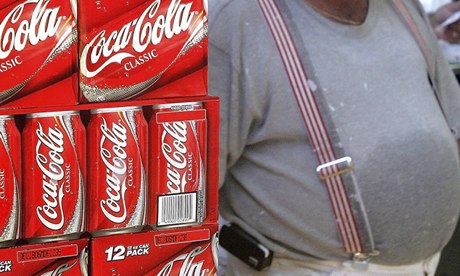
A 20% tax on Coca-Cola, Pepsi, Fanta and other sugar-sweetened drinks would cut the number of adults who are obese or overweight, researchers claim.
Concerned that the steep rise in sales of colas, lemonades and other sugary drinks is fuelling the obesity epidemic, doctors from the Academy of Medical Royal Colleges and organisations including the children's food campaign Sustain have been calling for a tax. A sharp rise in price, they hope, would make many people switch to diet versions or water, milk, tea or coffee.
The authors of a paper in the British Medical Journal have for the first time calculated what the impact of a 20% tax on such drinks would be on obesity.
The researchers, from Oxford and Reading, say a tax set at 20%, which would put 12p on a 60p can of cola, would reduce the number of obese UK adults by 180,000, a fall of 1.3%. It would cut the numbers who are overweight by 285,000 or 0.9%.
They say it would mostly help reduce the number of those who are obese or overweight in the 16-29 age group, who are the biggest consumers of these drinks.
"This is important to communicate to both the public and policymakers, who see the tax as a blanket measure on obesity," write Adam Briggs from the British Heart Foundation health promotion research group at Oxford University and his colleagues.
The effect of the tax on obesity would not differ between richer and poorer sectors of society – even though obesity is greater in more deprived communities. "Taxation represents a measure to target population obesity, particularly among young people, but should not be seen as a panacea," they write.
They say the tax would collect £276m a year. "This could be used to increase NHS funding during a period of budget restrictions or to subsidise foods with health benefits, such as fruit and vegetables."
They point out that the recent Global Burden of Disease study, published by the Lancet, found eating too little fruit and vegetables was a bigger cause of ill-health in the UK than drinking too many colas. "Using revenue from a sugar-sweetened drink tax to reduce the prices of fruit and vegetables is a potential mechanism for further improving population health," they write.
Other countries, including Hungary, Finland and France as well as nearly half the states in the US, have introduced or increased taxes on sugar-sweetened drinks and yet there is still considerable debate about whether they are appropriate.
Catherine Collins, principal dietitian at St George's Hospital NHS Trust, said that obesity peaks in the 45- to 74-year-old age group, who were not the biggest consumers of colas. She added that what we chose to eat and drink depended on many more factors than just price. "I think the tax 'stick' would beneficially reduce consumption of sweetened drinks, but it's a whole staircase of steps too far to presume such a tax would influence obesity in the UK."
Tom Sanders, professor of nutrition and dietetics at King's College London, said he thought the paper was naive. "The cost of sugar-sweetened beverages is currently so low that any price increase would be so marginal that it would be unlikely to affect intake. You can buy three litres of orange squash (28% sugar) for £1 in discount stores," he said.

